Africa RISING partnerships increase scaling out of agricultural technologies in Ethiopia
This post presents a synthesis of outcomes from the fourth (final) round of innovation platform meetings in Africa RISING project sites in Ethiopia, which took place in June-July 2016.
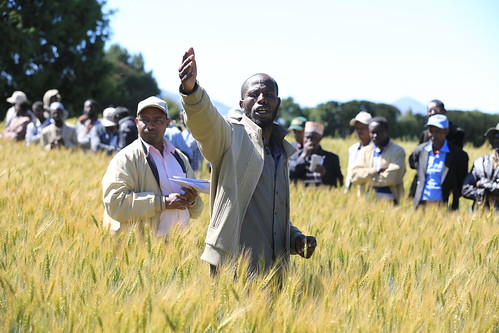
The Africa RISING project in the Ethiopian highlands has been conducting strategic innovation platform (IP) meetings at district level in all of its four research sites in Basona Worena, Sinana, Lemo and Endamehoni districts. These facilitated platform meetings bring together all relevant key stakeholders and partners to share site-specific research findings and encourage them to play active roles in the wider scaling of project innovations.
Experiences from the platform meetings show that promising scaling up activities are taking place with strong support from partners.
This collaborative effort will be used as a springboard for Africa RISING phase II which will focus on scaling up initiatives. Existing (and some new) development partners will lead the scaling up of lessons learned and innovations tested from phase I of the project.
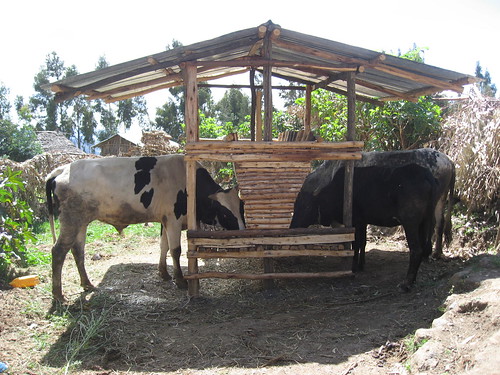
Africa RISING partners have been empowered to collaborate and engage with the project research and capacity building activities in different ways since 2013. They are aware of the most promising institutional and technological innovations for their sites. In addition to their day-to-day roles, partners are engaged twice a year in facilitated learning meetings of the strategic innovation platforms. These meetings comprise: 1) planning activities where efforts are made to engage partners in planning and designing the research activities before crops are planted and 2) farmers field days and evaluation meetings where all participating farmers, key actors and platform members jointly visit on-farm research activities and meet to evaluate and draw lessons for the subsequent year. Members have also participated in exchange visits across the project sites and in various capacity development activities.
Which innovations show promise for scaling up?
According to the IP members, ‘Gudene’ potato variety and high value fruit trees such as apple and avocado are the most promising technologies in Sinana and Lemo woredas and have been taken to scale with support from partners. Most of the non-participating farmers are now demanding tested and farmer-preferred improved variety seeds and seedlings.
In Tigray region’s Endamehoni woreda, innovations introduced by the Africa RISING project that show promise to scale up include crop residues, shed and feed troughs, faba bean disease control measures, and improved wheat varieties. These are now being integrated in the plans of Woreda and Zonal offices of agriculture to support upscaling.
In Basona Worena, promising technologies for scaling up include work on watershed management, and improved crop varieties and livestock feeds.
Investment in partnership leads to support for scaling up efforts
In all four sites, innovation platform members are now encouraging and supporting efforts to scale up and out. From the get-go, Africa RISING has invested in partnership building through its innovation platforms. All key research and development partners have been identified and engaged throughout the project. The main reason for creating a space for partners and facilitating learning and sharing events through innovation platforms at district and kebele level was to co-create innovations. All technologies tested and found promising in all research sites are the result of all partners working together. Local partners’ interest to support scaling up efforts emanates from the programs focus of supporting smallholder farmers to intensify their mixed crop-livestock farming systems, which is well aligned with government’s and development partners’ priorities.
Reflections from partners
Partners are now witnessing real change on the ground, brought about by the project’s interventions at their sites. They also realize that the technologies implemented by farmers can be instrumental in bringing about development outcomes within a short time.
‘Currently, developing countries such as Ethiopia need to meet their food needs under the growing population and agricultural technologies are the best option of increasing production and productivity. Africa RISING has introduced many successful food and feed crop, fruit and tree technologies and other improved practices,‘ said Woldu Teka, head of Endamehoni woreda administration.
‘By bringing about a culture of working together and collaboration among different organizations, this project has made farmers such as myself part of the research process and helped us interact with experts from different organizations, enabling us to improve our practices and (gender) relationships,’ said Hussein Haileadem a farmer from Sinana.
The use of innovation platforms and farmer research groups (FRGs) has encouraged and motivated farmers to participate in different research activities and develop positive attitudes toward using new technologies’ says Soleyman, director of Sinana Agricultural Research Centre.
Specific interventions for scaling up by partners
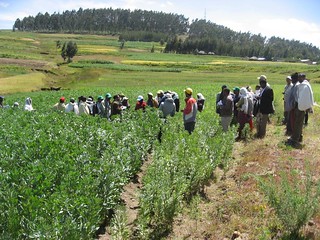
Shewangizaw Hailemichael, the Basona Worena woreda office head of agriculture, says his office is already incorporating the scaling up of Africa RISING technologies into their its plans. They have scaled ‘Tsehay’ and ‘Menzie’ bread wheat varieties to 10 kebeles and for the 2016 cropping season, have purchased 2,000 kg of seeds of these two varieties. They have also started to organize farmers seed cooperatives to institutionalize the seed supply system throughout the woreda.
Debre Birhan Agricultural Research Center (DBARC) representative and IP member, Abiro Tigabe, reported during the 4th IP meeting that the centre supported the ‘Dosha’ faba bean variety to be multiplied by farmers on 5 hectares at Mush village last year and 6,700 kg of good-quality seed has been collected by the Mush farmers’ cooperative. He said the centre plans to scale up the Dosha variety on 18 hectares of land at Gudo Beret kebele in 2016 and they have purchased 2,700 kg of seed from the farmers’ cooperative for this. The centre also plans to scale up Tsehay bread wheat at Gudo Beret Kebele and Bekoji malt barley variety at Angolela Kebele.
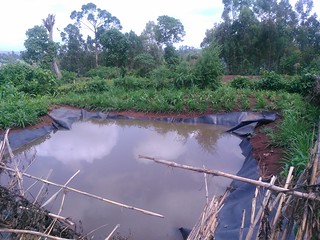
Lemo woreda in the southern region implemented promising interventions on high-value fruit trees (avocado). Farmers asked for larger quantities of improved and grafted avocado seedlings. Africa RISING and the local partners have agreed to support access to the germplasm by linking farmers to the nearest avocado seedlings nursery site and to train farmers on grafting methods so that they can sell the seedlings to fellow farmers.
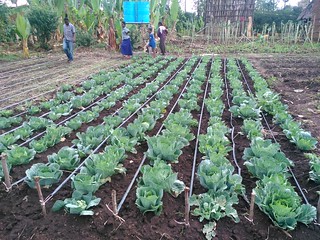
Most participating farmers in Lemo woreda have improved their livelihoods by intensifying production in their small plots of land by adopting a tree-crop-livestock farming system. Alemu, a farmer from Jawe kebele is one of the participating farmers. He has only 0.5 hectares of farmland which supports his family. He said his participation in multiple research trials including water harvesting, vegetable production, high-value fruit trees and livestock feed enabled him to diversify his income and his farm products. ‘I now also have a water harvesting pond and can irrigate 2,000 square metres during the dry season and cultivate cash crops such as cabbage and carrot for sale and household consumption,’ he said.
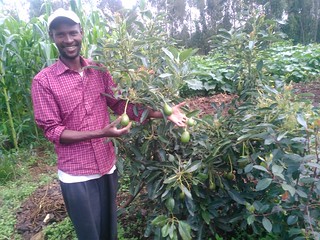
In Tigray’s Endamehoni District the key partners of Africa RISING project that support scaling up are the Alamata Agricultural Research Centre (AARC), Endamehoni woreda office of agriculture and administration, an NGO knowns as Graduation with Resilience to Achieve sustainable Development (GRAD) and the Tigray Agricultural Research Institute (TARI). Farmers have adopted the improved feeding trough and crop residue storage facilities introduced by the project and demonstrated to farmers by these partners.
These technologies, which farmers call ‘Altayesh’ (meaning ‘never seen before’), minimize wastage of crop residues that occur during feeding and storage by 30% and 50%, respectively, which has increased livestock productivity. The woreda office of agriculture and administration, TARI and the regional bureau of agriculture have already made plans to scale up these technologies within the woreda, zone and the region through demonstrations. The director of AARC said the centre will take faba bean crop disease control system, which was found very effective and successful, to farmers working with the centre who have similar disease problems.
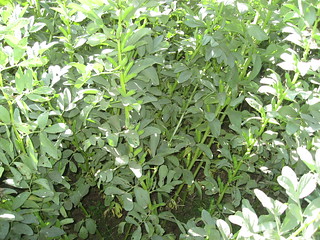
In Sinana woreda in Oromia, partners have created strong partnerships through their strategic IP. During the fourth IP meeting, partners agreed to support further scaling-up efforts in the woreda which has 18 kebeles and Africa RISING project sites. The will work towards breaking the wheat mono-cropping practice through crop rotation for better nutrition, soil nutrient improvement, increasing productivity and solving disease outbreak (e.g. wheat rust), which is a priority in the Bale highlands.
Farmers in Sinana identified potato and wheat as preferred crops.
‘I have participated in community seed multiplication of improved bread wheat (Hidassie) and durum wheat varieties harvested 18 tons from 3 hectare and sold it to 180,000 ETB (USD 9,000).The improved wheat variety not only increased the productivity but also good quality and quantity of crop residue and I am sharing these lessons to my fellow farmers to adopt the technologies,’ said Hussen Haji Adam from Selka Kebele administration.
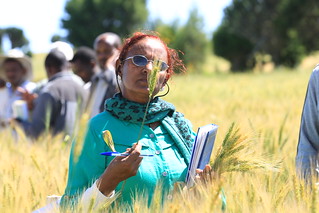
More than 18 diffused light storage facilities for one of the preferred improved potato varieties introduced by the project were constructed by farmers with support from the project to store quality seeds and encourage farmer-to-farmer extension system for seed distribution. Farmers’ demand for potato seeds is still increasing and they have been organizing themselves to have access to potato seeds from other areas in their region. The zonal office of agriculture, Madawalabu University and other partners and IP members have invested in supporting scaling up efforts for farmers to have access to potato seeds in this region since 2015.
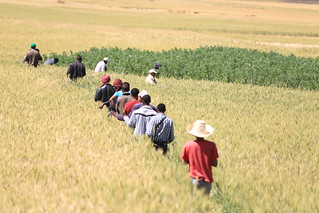
Lessons learned
- Strategic innovation platforms in each district have brought about a culture of collaboration among key stakeholders in agriculture and helped the project to target site-specific issues.
- Engaging local and relevant partners in Africa RISING research for development activities helped bring appropriate technologies AND created ownership, which strengthened the existing local capacity to support up-scaling efforts.
- Bringing farmers to the frontline of testing and owning research that was based on their own interests was effective in convincing participating and non-participating farmers to adopt improved technologies.
- Linking participating farmers with other non-participating farmers for learning and sharing through farmer field day demonstration trials and evaluations (e.g. of varieties through participatory variety selection – PVS) enhanced farmer-to-farmer extension and scaling up.
- Cross-site experience sharing visits for experts, decision-makers and farmers allowed actors across different sites to learn from each other by seeing their challenges from a different perspective.
By Zelalem Lema, Kindu Mekonnen and Peter Thorne of ILRI.




